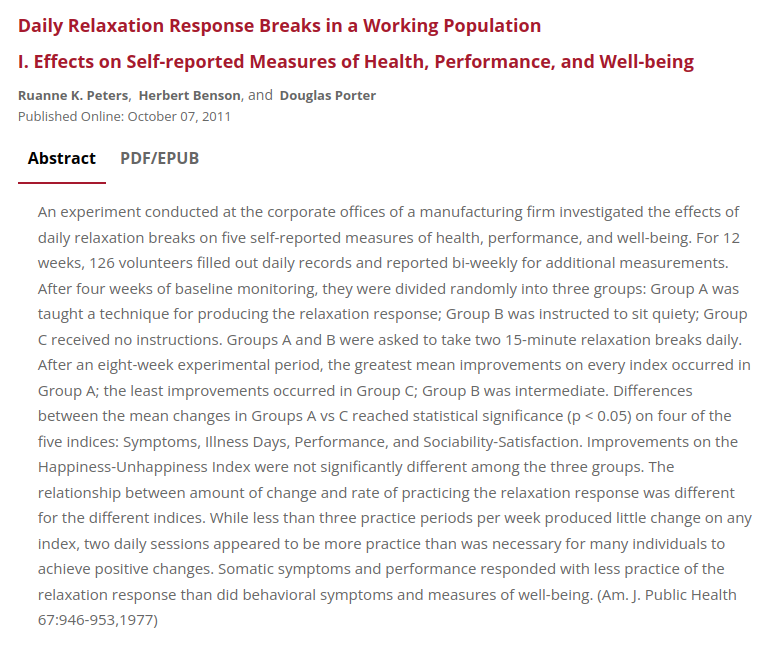An experiment conducted at the corporate offices of a manufacturing firm investigated the effects of daily relaxation breaks on five self-reported measures of health, performance, and well-being. For 12 weeks, 126 volunteers filled out daily records and reported bi-weekly for additional measurements. After four weeks of baseline monitoring, they were divided randomly into three groups: Group A was taught a technique for producing the relaxation response; Group B was instructed to sit quiety; Group C received no instructions. Groups A and B were asked to take two 15-minute relaxation breaks daily. After an eight-week experimental period, the greatest mean improvements on every index occurred in Group A; the least improvements occurred in Group C; Group B was intermediate. Differences between the mean changes in Groups A vs C reached statistical significance (p < 0.05) on four of the five indices: Symptoms, Illness Days, Performance, and Sociability-Satisfaction. Improvements on the Happiness-Unhappiness Index were not significantly different among the three groups. The relationship between amount of change and rate of practicing the relaxation response was different for the different indices. While less than three practice periods per week produced little change on any index, two daily sessions appeared to be more practice than was necessary for many individuals to achieve positive changes. Somatic symptoms and performance responded with less practice of the relaxation response than did behavioral symptoms and measures of well-being.
Daily Relaxation Response Breaks in a Working Population I. Effects on Self-reported Measures of Health, Performance, and Well-being
Publication
Am. J. Public Health
67:946-953
Abstract
Web and Email Links
Related Listings
Journal
Journal of Human Stress
Oxygen consumption is usually considered to be predictable and unalterable at a fixed work intensity. The relaxation response is hypothesized to be an integrated hypothalamic response which results in generalized decreased sympathetic nervous system activity. One physiologic manifestation of the relaxation response is decreased oxygen consumption. The possibility that the elicitation of the relaxation response could decrease oxygen consumption at a fixed work intensity was investigate […]
Journal
Behavioral Medicine
To examine the extent to which advanced meditative practices might alter body metabolism and the electroencephalogram (EEG), we investigated three Tibetan Buddhist monks living in the Rumtek monastery in Sikkim, India. In a study carried out in February 1988, we found that during the practice of several different meditative practices, resting metabolism ([Vdot]O2) could be both raised (up to 61%) and lowered (down to 64%). The reduction from rest is the largest ever reported. On the […]
Journal
Behavioral Medicine
This study evaluated the efficacy of the relaxation response on the postoperative recovery of 27 cardiac surgery patients randomly assigned to one of two groups. Thirteen experimental group patients received educational information and practiced eliciting the relaxation response before and after surgery. The 14 patients in the control group received only information. Experimental and control groups were compared before and after surgery on both physiological and psychological recovery […]

